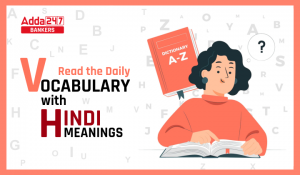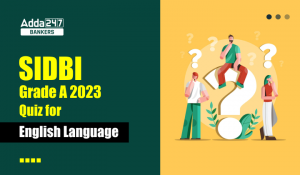This section can be easy as pie if your basics are clear. Sometimes, even those who can communicate very well in English, fail to perform to the best of their ability in the banking exams. So, instead of boiling the ocean, try building up a strong vocabulary, an effective knowledge of grammar, and efficient comprehension skills so as to be on the ball to face this particular section. Here is a quiz being provided by Adda247 to let you practice the best of latest pattern English Questions.
Direction (1-15): Below in each questions, some sentences are given, find the sentence which is not really contributing to the main theme and OUT of the passage or find the odd sentence and rearrange the remaining sentences to make a coherent paragraph.
Q1. (A) The reference was to china, a country that has been courting Pakistan for several years through a number of means including assistance in its nuclear programme.
(B) After the Uri attacks, Pakistan’s special Kashmir envoy Mushaid Hussain declared that the US was a waning power, suggesting that Pakistan was seeking out other allies.
(C) The most important concern relates to the possible conflict in Pakistan between votaries of economic development and supporters of militancy.
(D) This corridor-which includes road, rail and port infrastructure-is expected to allow China to avoid the vulnerable Indian ocean route currently used to transport oil from the gulf.
(E) Of late, there has been much talk of the China-Pakistan Economic Corridor (CPEC) that stretches from the autonomous region of Xinjiang to the Gwadar port.
Q2. (A) India recently ratified the Paris Agreement, assuring it a seat at the 55/55 table
(B) ratification by at least 55 countries and accounting for at least 55 % of global greenhouse gas(GHG) emissions was required for the agreement to come into force.
(C) where countries will negotiate the mechanism and provisions under the agreement.
(D) with the ratification, India has demonstrated leadership in climate negotiations but left some with concerns about signing an agreement without realizing its full implications.
(E) There are certain targets India wants to achieve and to achieve that there is a need to allocate mitigating burden among states and also prioritize adaptation efforts.
Directions (3-5): In each of the following questions a short passage is given with one of the lines in the passage missing and represented by a blank. Select the best out of the five answer choices given, to make the passage complete and coherent (coherent means logically complete and sound).
Q3. After two years, high inflation moderated in the later part of 2011-12 in response to past monetary tightening and growth deceleration. High inflation had adverse consequences on welfare and on saving and investment, particularly household saving I financial assets. The most serious consequences of inflation is ……As growth slowed down , in part due to high inflation, it further reduced the welfare of the common man through adverse impact on employment and incomes.
(A) Its destructive allocation impact on the industries that were lately coming up.
(B) its negative impact on the rich and high-profile people.
(C) Its adverse distributional impact on the poor, people without social security and pensioners.
(D) Its wayward consequences on the public distribution system meant for the poor.
(E) Its unfavourable bearing on day to day commodities that are used by the common man.
Q4. Let us understand the definition of metaphysics, a purely speculative science, which occupies a completely isolate position and is entirely independent of the teaching of experience. It deals with mere conceptions-not, like mathematics, with conceptions applied to intuition –and in it, reason is the pupil of itself alone. It is the oldest of the sciences.(……………………)
(A) And it would struggle to survive without the architecture of mathematical support that it draws its strength from
(B) yet it continued to baffle mankind because of its abstractions.
(C) But it has never had never will have the good fortune to attain to the sure scientific method.
(D) And it would still survive, even if all the rest were swallowed up in the abyss of an all-destroying barbarism.
(E) The critical science is not opposed to the dogmatic procedure of reason in pure cognition; for pure cognition must always be dogmatic.
Q5. Aggregation of risks is somewhat quite new to blanks in India. While some banks have started thinking in that line by trying to put integrated limits framework and integrated risk policies as well as using CBS solutions for technological integration, the effort required is beyond such requirement. Risk aggregation would mean aggregating the individual risk measures to decide most appropriate assets class that would contain the risk to the desired level dictated by the risk appetite. Capital allocation (about how much) would be based on such strategies……………………….
(a) Most banks are yet to conceptualize the same in their processes.
(b) Most banks have already integrated it in their functioning; it is working over the years satisfactorily.
(c) Which would in long run prove to be the growth impeding.
(d) Of risk aggregation which is really a new concept to Indian banks
(e) On expected lines of the regulation condition laid down in the manual of the bank
Q6. (A). It is time that we started exposing our children to rationalism so that they can evaluate its merits and choose for themselves what to believe in. ‘Forget god, consider man’ is good advice as humanism is the only way to take mankind toward peace and progress.
(B) As a nation we have been pandering to religious sentiments for too long.
(C) The extra food produced by the Green Revolution is generally considered to have averted famine in India and Pakistan.
(D) Right from the days of Partition, the various riots, the demolition of the Babri Majid, the Gujarat riots and beyond, the trail of violence and loss of lives and properties caused as a result of religion is too large to document. Even the father of the nation was eliminated by religious fanatics.
(E) The ‘graded inequality’ among people of the same religion imposed by the caste system — and despite legislation banning it — continues to inflict unspeakable misery on a significant section of the people to this day.
(a) AEDC
(b) EDAC
(c) DECB
(d) BDEA
(e) BACB
Q7. (A) Today, politics in India is a no-holds-barred game, dirtier than ever and which most political leaders indulge in.
(B) It is unfortunate that the healthy convention of political figures not washing domestic dirty linen in public while abroad is now dead and buried.
(C) While addressing an event at the University of California, Berkeley, Congress vice-president Rahul Gandhi played the role expected of him.
(D) While the BJP is up in arms over his speech and comments, one cannot but admit that the Prime Minister too has broken that convention time and again.
(E) Credit partly goes to the government’s blunders that seem to have infused a new life into Mr. Gandhi’s otherwise flagging political career.
(F) Once we receive payment for your judging we will take care of covering that for you, no further action is required.
(a) BCAFE
(b) BACED
(c) AFEBC
(d) FEACD
(e) FABCE
Q8. (A) Chairmen and other members of the existing tribunals who are aged 70, on the date of commencement of the 2017 Amendment Act, shall cease to hold office on the expiry of three months from the date of the law coming into existence.
(B) With water becoming scarce, the Centre has proposed the Inter-State River Water Disputes (Amendment) Bill, 2017 for early and amicable resolution of disputes. The Bill proposes that the Centre notify an Inter-State River Water Disputes Tribunal with multiple benches.
(C) Kaveri is considered to be as sacred as the Ganga throughout its course, with the same power to wash off all one’s sins.
(D) Disputes already settled by an existing tribunal, prior to the date of commencement of the 2017 Amendment Act, shall not be re-opened.
(E) All existing tribunals dealing with inter-State water disputes would stand dissolved on the date of establishment of this tribunal.
(a) EDBA
(b) DAKE
(c) BEAD
(d) CDAB
(e) CEBA
Q9. (A) Blessed with every major ecosystem, these biomes directly contribute billions of dollars to the Indian economy, annually.
(B) The financial value of India’s forests, for example, which encompass economic services such as timber and fuel wood, and ecological services such as carbon sequestration, is estimated to be $1.7 trillion.
(C) Natural resources are a critical yet often ignored part of our country’s national infrastructure.
(D) It is necessary that we are cognizant of the limitations of natural capital and its role as a primary support system for the economy.
(E) Boasting 11% of the world’s floral and faunal species, India is one of the 17 most ecologically diverse countries.
(a) EDBA
(b) CEAB
(c) ABDE
(d) AEDC
(e) EABC
Q10. (A) But such gains could have been achieved by other and less self-defeating ways. As things stand, it is unclear how many of those who have laundered their black money will be punished.
(B) Despite the large amounts that were deposited in banks post-demonetisation, it is doubtful whether the Income Tax authorities have the necessary resources to track down and penalize the corrupt.
(C) Explaining how the shock move would work, he said: “The… notes hoarded by anti-national and anti-social elements will become just worthless pieces of paper.”
(D) True, demonetisation has had some beneficial spin-offs such as arguably fostering greater compliance with the tax laws and reducing the economy’s reliance on cash through increased adoption of digital payments.
(E) All in all, the costs of demonetisation, which has resulted in robbing the country of its economic momentum, are far greater than the benefits it has bestowed.
(a) BCAD
(b) ABDC
(c) DABE
(d) CDAB
(e) EBAC
Q11. (A) There has to be a shift away from large budgets for collection and transport by private contractors, to the processing of segregated garbage.
(B) Improving on the national record of collecting only 80% of waste generated and being able to process just 28% of that quantum, requires behaviour modification among citizens and institutions.
(C) But what is more important is that the municipal bodies put in place an integrated system to transport and process what has been segregated at source.
(D) More than a year after the notification of the much-delayed Solid Waste Management Rules, cities and towns are in no position to comply with its stipulations, beginning with the segregation of different kinds of waste at source and their scientific processing.
(E) Neither are urban local governments treating the 62 million tonnes of waste generated annually in the country as a potential resource. They have left the task of value extraction mostly to the informal system of garbage collectors and recyclers.
(a) BDAE
(b) ADBC
(c) DEBC
(d) ABDC
(e) DAEC
Q12. (A) It is also ironic that while some countries such as Rwanda and Kenya have introduced stiff penalties for the use of flimsy plastic bags, India is doing little to prevent them from drifting into suburban garbage mountains, rivers, lakes and the sea, and being ingested by cattle feeding on dumped refuse.
(B) In the absence of stakeholders at the local body level, recoverable resources embedded in discarded materials are lost due to dumping.
(C) Quantum is the Latin word for amount and, in modern understanding, means the smallest possible discrete unit of any physical property, such as energy or matter.
(D) But it is a major opportunity lost. Organic waste that could help green cities and feed small and affordable household biogas plants is simply being thrown away.
(E) Organic refuse, which forms about 50% of all garbage, readily lends itself to the generation of compost or production of methane for household use or power generation.
(a) CEAB
(b) BCDA
(c) BEAC
(d) CABD
(e) CADE
Q13. (A) Given such constraints, farmers have limited scope for crop diversification, choosing to focus primarily on staple crops such as wheat and rice, where the government offers a price guarantee for produce and the availability of post-harvest infrastructure.
(B) Large farmers in Maharashtra typically have access to modern pumps, consuming huge amounts of water and leaving hardly anything for small and marginal farmers.
(C) They rose in revolt but were crushed by the East India Company until the arrival of a barrister from South Africa.
(D) The limited availability and high cost of high-yielding seed varieties also hampers agricultural productivity.
(E) Fertilizer and pesticide prices have also risen, causing marginal farmers to adopt organic means.
(a) DEBA
(b) BEDA
(c) FDAB
(d) EBCA
(e) DCDE
Q14. (A) All this can be changed if the government abolishes private practice, institutes universal medical care and becomes the employer of all medical graduates, similar to the National Health Service of the U.K.
(B) This egregious state of affairs led to several persons approaching courts.
(C) Doctors from poorer backgrounds will need to struggle a lot more.
(D) Inequality among qualified doctors is quite high. The economically well-off can aspire to better jobs, training abroad (still much sought after in spite of all nationalist talk), and generally adopt metropolitan lifestyles.
(a) DCA
(b) CBA
(c) ACD
(d) DCB
(e) DAB
Q15. (A) This makes it worthwhile to interrogate the kind of spaces where PDOs are currently being deployed and their claims to being ‘public’.
(B) Recent moves by the Telecom Regulatory Authority of India (TRAI) to pilot public open WiFi hotspots through a nationwide model of pay as you go public data offices (PDOs) is a concerted bid to make cheap, fast, and reliable Internet affordable and accessible.
(C) According to the ‘Public WiFi Open Pilot’ document released by TRAI, the PDOs are encouraged to be the kind of spaces where “consumption of data for the average Indian becomes as common as consuming a cup of hot chai.”
(D) In its plans to swiftly facilitate and scale WiFi infrastructure, TRAI is drawing inspiration from the public call office (PCO) telephone booths that spawned a communication revolution in India.
(a) CDB
(b) BEA
(c) BCD
(d) CDA
(e) CAD





 Daily Vocabulary Word 28th April, 2023 -...
Daily Vocabulary Word 28th April, 2023 -...
 English Quizzes For SIDBI GRADE A 2023- ...
English Quizzes For SIDBI GRADE A 2023- ...










